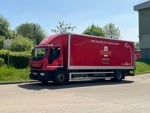This article has been taken from the FN50 2024 special report, providing insight into the UK’s biggest car, van and truck contract hire, leasing and fleet management.

Broker channels account for around a quarter of leasing company vehicles, this year’s FN50 research reveals, highlighting the importance suppliers play in the success of the industry.
The UK’s biggest leasing companies provided data on the proportion of business arriving through broker channels for this year’s FN50 survey; the proportion varies significantly by company, from zero to more than 60%.
Overall, 26 of the 43 leasing companies who provided data say they use brokers, with 19 indicating that 10% or more of their fleet is sourced through partners; of these, nine leasing companies say more than 30% of their fleet is broker-related, while for two it is more than 50%.
The largest FN50 companies dominate the broker market, with 70% of the top 10 using indirect sales channels, which typically provide 35% of their fleet.
Between them, the top 10 FN50 companies operate 90% of the estimated 400,000 broker-derived vehicles in the FN50 fleet, representing more than £12 billion in new vehicle sales.
According to the bi-annual British Vehicle Rental & Leasing Association (BVRLA) leasing broker survey, business contract hire is the main driver for the sector, representing 95% of the business finance fleet.
For consumer finance, personal contract hire dominates, but salary sacrifice (sal/sac) is growing rapidly, with its share of the consumer fleet reaching just more than 1%.
Although the latest broker data points to a dip in new contracts from highs achieved in 2023 (except sal/sac, which continues to grow), brokers remain confident they can overcome any challenges ahead, working in partnership with leasing providers
A positive outlook for a changing market
Brokers have a positive outlook for the industry as they adopt an agile approach in response to changing customer needs, particularly when it comes to small-to-medium-sized businesses (SMEs) that require high levels of support in an increasingly complex fleet environment.
This includes advice ranging from funding options to fuel choice and curating a selection of the best leasing providers and services on the market, tailored to suit customer needs.
Will Voisey, managing director of Synergy Car Leasing, says: “The right broker partner is an extension of the fleet manager’s team, working hand-in-hand to deliver their requirements.
“We are very optimistic about the coming year. As the cost-of-living increase begins to slowly ease, we expect to see renewed confidence in both businesses and private individuals, who may have held back on leasing a new vehicle until now.”
It is a view shared by Graham Lesslie, CEO of Edinburgh-based Gofor, which provides funding solutions as part of an array of fleet management services.
He adds: “We are expecting the market to grow, particularly in the business-to-business space where we operate.
“Businesses need more support with the ‘heavy lifting’ elements of fleet management. It is always about the added value that a partner can bring, not just the cheapest price point.”
The power of the panel
Delivering the best services at the most competitive price is a key role for brokers and shows the ‘power of the panel’, according to Andy Bruce, CEO of Fleet Alliance, where chosen funders bid against each other to secure a new vehicle order.
“The concept of panel funding has never been more important,” he says.
“Over the past 12 months, we have made an average saving of more than 9% for new clients we have onboarded by employing panel funding.”
This broader perspective is proving essential to navigating changing market conditions, such as the transition to electric vehicles (EVs).
Changes in new vehicle pricing and residual values are creating peaks and troughs in rates that require expert analysis to minimise costs.
For example, Fleet Alliance identified variations of up to £200 in monthly leasing rates among its panel of 11 funders between the highest and lowest quote for the same EV.
“The growing number of new electric cars coming to market underlines perfectly why panel funding is so important,” Bruce adds.
“No one company can be expert on each make and model. By pooling knowledge, and rates, we can tap into the collective knowledge of the market and secure the most advantageous costs for our customers.”
Brokers 'critical' to EV switch success
Their broad perspective of the entire market is one of the key reasons brokers believe they have a critical role to play helping fleets to switch to EVs, and also enabling manufacturers to comply with ZEV Mandate targets.
Rod Lloyd, chair of the BVRLA’s Broker Committee and CEO of The LCV Group, says: “As a sector, we are already comfortably above ZEV Mandate targets and remain a route for manufacturers to meet their obligations.”
The BVRLA’s latest broker analysis for June 2024 shows that 27% of the broker car fleet is battery electric vehicles (BEVs), with pure EVs accounting for 45% of the business contract hire fleet.
However, demand slowed in the first half of the year and Lloyd believes more Government support is needed to deliver market stability.
He adds: “The phase out (in 2030 or 2035) represents a significant risk to us unless we see greater Government support.”
This is particularly the case for electric vans, where demand is lagging far behind ZEV Mandate targets. Global Vans CEO Andrew Hurst believes the industry is ‘uniquely positioned’ at the heart of the market to enable change, but agrees that further support is needed.
He says: “The Government will need to step in to create EV demand and increase infrastructure to prevent the EV transition stalling.”
He adds that a key consideration for slow growth in e-LCVs is that electric vehicles may not be the best solution for all, adding: “We must remind the Government that new ICE (internal combustion engine) vehicles are still better for the environment than older ones.”
For Synergy Car Leasing, getting the message across has meant inviting a local MP to its offices to raise awareness of the key role brokers are playing, and campaigning for more Government involvement.
Graham Lesslie, CEO of Gofor, adds: “The industry simply can’t meet the ZEV Mandate without brokers on board.”
He wants to see more extensive efforts to dispel EV myths, citing YouGov research that found one-third of small businesses have no plans to reduce emissions, adding: “Continued messaging will be key, alongside a strong Government narrative on electrification.”
AI improves growth and customer service
In addition to electrification, brokers are also grappling with the pace of artificial intelligence (AI) development and its impact on business processes.
Lesslie says: “AI adoption will have a big impact on broker performance for those that use it well. “AI and data-driven decision-making should allow brokers to offer even better service, while freeing up time to enhance quality and engage in more meaningful customer interactions.”
In June, broker software platform MotorComplete announced it was rolling out an automotive AI chat product that has previously proved highly successful with dealers.
Ben Harratt, chief technology officer of partner AI company AutoConverse, says: “It seems like an optimal time to expand to the broker market.
The technology has been proven beyond all doubt in the retail sector, where we have seen clients double their leads and halve their costs by switching from human-led chat systems.”
However, despite the digital drive, brokers say the personal touch remains vital. Synergy Car Leasing’s Voisey adds: “The customer relationship requires both parties (broker and leasing company) to play their individual roles to the best of their abilities.
“A bad experience provided by a leasing company reflects negatively on the broker who introduced the customer to that leasing company, and vice versa. “Retention of customers requires mutual co-operation; we need to give the customer a reason to not have to go elsewhere.”


















Login to comment
Comments
No comments have been made yet.